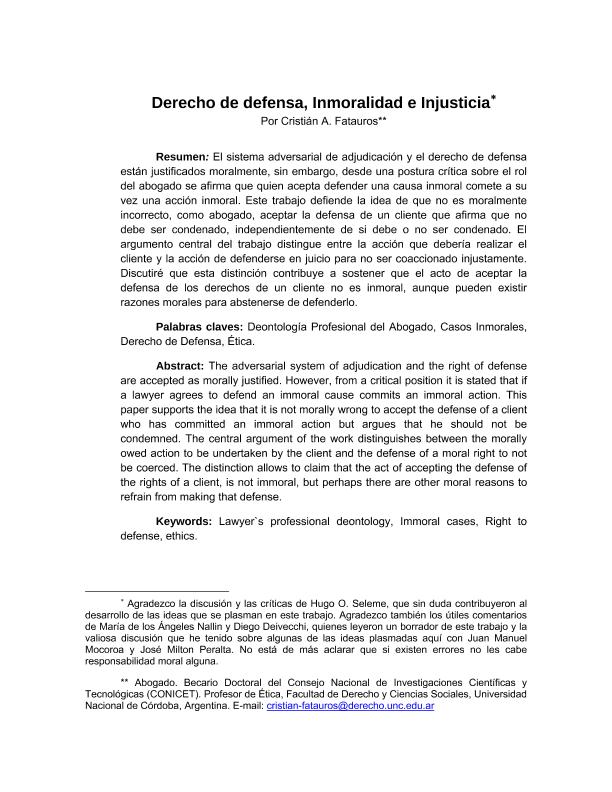Mostrar el registro sencillo del ítem
dc.contributor.author
Fatauros, Cristian Augusto

dc.date.available
2023-04-14T14:17:45Z
dc.date.issued
2014-04-07
dc.identifier.citation
Fatauros, Cristian Augusto; Derecho de defensa, inmoralidad e injusticia; Los Libertadores. Fundación Universitaria; Revista Via Iuris; 11; 7-4-2014; 79-88
dc.identifier.issn
1909-5759
dc.identifier.uri
http://hdl.handle.net/11336/193859
dc.description.abstract
El sistema adversarial de adjudicación y el derecho de defensa están justificados moralmente, sin embargo, desde una postura crítica sobre el rol del abogado se afirma que quien acepta defender una causa inmoral comete a su vez una acción inmoral. Este trabajo defiende la idea de que no es moralmente incorrecto, como abogado, aceptar la defensa de un cliente que afirma que no debe ser condenado, independientemente de si debe o no ser condenado. El argumento central del trabajo distingue entre la acción que debería realizar el cliente y la acción de defenderse en juicio para no ser coaccionado injustamente. Discutiré que esta distinción contribuye a sostener que el acto de aceptar la defensa de los derechos de un cliente no es inmoral, aunque pueden existir razones morales para abstenerse de defenderlo.
dc.description.abstract
The adversarial system of adjudication and the right of defense are morally justified (Fiss, 1999), however, from a critical role of the lawyer (cf. Kennedy, 1986) it has been said that the one who agrees defending an immoral cause commits itself an immoral action (Rivera Lopez, 2010). By the method of logical and conceptual analysis, this work defends the idea that it is not morally wrong, as a lawyer, to accept the defense of a client who claims not to be condemned, regardless of whether or not to be condemned. The argument rests on the distinction between action that should make the client and the action to defend themselves in court. The conclusion of this work is that this distinction allows to argue that the act of accepting the defense of a client is not immoral, but there may be moral reasons to refrain from defending it.
dc.format
application/pdf
dc.language.iso
spa
dc.publisher
Los Libertadores. Fundación Universitaria
dc.rights
info:eu-repo/semantics/openAccess
dc.rights.uri
https://creativecommons.org/licenses/by-nc-sa/2.5/ar/
dc.subject
CASOS INMORALES
dc.subject
DEONTOLOGÍA PROFESIONAL DEL ABOGADO
dc.subject
DERECHO DE DEFENSA
dc.subject
ÉTICA
dc.subject.classification
Derecho

dc.subject.classification
Derecho

dc.subject.classification
CIENCIAS SOCIALES

dc.title
Derecho de defensa, inmoralidad e injusticia
dc.type
info:eu-repo/semantics/article
dc.type
info:ar-repo/semantics/artículo
dc.type
info:eu-repo/semantics/publishedVersion
dc.date.updated
2023-04-11T14:30:34Z
dc.journal.number
11
dc.journal.pagination
79-88
dc.journal.pais
Colombia

dc.journal.ciudad
Bogotá
dc.description.fil
Fil: Fatauros, Cristian Augusto. Consejo Nacional de Investigaciones Científicas y Técnicas; Argentina. Universidad Nacional de Córdoba. Facultad de Derecho y Ciencias Sociales. Centro de Investigaciones Juridícas y Sociales; Argentina
dc.journal.title
Revista Via Iuris
dc.relation.alternativeid
info:eu-repo/semantics/altIdentifier/url/https://dialnet.unirioja.es/servlet/articulo?codigo=3956712
dc.relation.alternativeid
info:eu-repo/semantics/altIdentifier/url/https://revistas.libertadores.edu.co/index.php/ViaIuris/article/view/123
Archivos asociados
